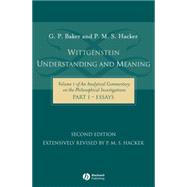
What is included with this book?
| Acknowledgements | xi | ||||
| Introduction to Part I: Essays | xiii | ||||
| Abbreviations | xix | ||||
| I The Augustinian conception of language (§1) | 1 | (28) | |||
|
1 | (3) | |||
|
4 | (10) | |||
|
4 | (2) | |||
|
6 | (1) | |||
|
7 | (2) | |||
|
9 | (2) | |||
|
11 | (3) | |||
|
14 | (5) | |||
|
19 | (4) | |||
|
23 | (3) | |||
|
26 | (3) | |||
| II Explanation (§6) | 29 | (16) | |||
|
29 | (4) | |||
|
33 | (2) | |||
|
35 | (4) | |||
|
39 | (6) | |||
| III The language-game method (§7) | 45 | (20) | |||
|
45 | (9) | |||
|
54 | (3) | |||
|
57 | (4) | |||
|
61 | (2) | |||
|
63 | (2) | |||
| IV Descriptions and the uses of sentences (§18) | 65 | (16) | |||
|
65 | (2) | |||
|
67 | (3) | |||
|
70 | (3) | |||
|
73 | (3) | |||
|
76 | (5) | |||
| V Ostensive definition and its ramifications (§28) | 81 | (26) | |||
|
81 | (2) | |||
|
83 | (5) | |||
|
88 | (4) | |||
|
92 | (5) | |||
|
97 | (6) | |||
|
103 | (4) | |||
| VI Indexicals (§39) | 107 | (6) | |||
| VII Logically proper names (§39) | 113 | (16) | |||
|
113 | (4) | |||
|
117 | (3) | |||
|
120 | (4) | |||
|
124 | (5) | |||
| VIII Meaning and use (§43) | 129 | (30) | |||
|
129 | (7) | |||
|
136 | (8) | |||
|
144 | (8) | |||
|
152 | (7) | |||
| IX Contextual dicta and contextual principles (§50) | 159 | (30) | |||
|
159 | (5) | |||
|
164 | (6) | |||
|
170 | (1) | |||
|
171 | (2) | |||
|
173 | (8) | |||
|
181 | (8) | |||
| X The standard metre (§50) | 189 | (12) | |||
|
189 | (3) | |||
|
192 | (1) | |||
|
193 | (4) | |||
|
197 | (4) | |||
| XI Family resemblance (§65) | 201 | (26) | |||
|
201 | (7) | |||
|
208 | (4) | |||
|
212 | (4) | |||
|
216 | (3) | |||
|
219 | (3) | |||
|
222 | (2) | |||
|
224 | (3) | |||
| XII Proper names (§79) | 227 | (24) | |||
|
227 | (3) | |||
|
230 | (3) | |||
|
233 | (2) | |||
|
235 | (3) | |||
|
238 | (1) | |||
|
239 | (5) | |||
|
244 | (7) | |||
| XIII Turning the examination around: the recantation of a metaphysician (§89) | 251 | (20) | |||
|
251 | (2) | |||
|
253 | (3) | |||
|
256 | (3) | |||
|
259 | (4) | |||
|
263 | (3) | |||
|
266 | (5) | |||
| XIV Philosophy (§109) | 271 | (36) | |||
|
271 | (6) | |||
|
277 | (7) | |||
|
284 | (3) | |||
|
287 | (3) | |||
|
290 | (4) | |||
|
294 | (5) | |||
|
299 | (4) | |||
|
303 | (4) | |||
| XV Surveyability and surveyable representations (§ 122) | 307 | (28) | |||
|
307 | (4) | |||
|
311 | (9) | |||
|
320 | (6) | |||
|
326 | (9) | |||
| XVI Truth and the general propositional form (§134) | 335 | (22) | |||
|
335 | (5) | |||
|
340 | (4) | |||
|
344 | (2) | |||
|
346 | (3) | |||
|
349 | (8) | |||
| XVII Understanding and ability (§143) | 357 | (30) | |||
|
357 | (2) | |||
|
359 | (3) | |||
|
362 | (5) | |||
|
367 | (8) | |||
|
368 | (1) | |||
|
369 | (2) | |||
|
371 | (2) | |||
|
373 | (2) | |||
|
375 | (5) | |||
|
380 | (7) | |||
| Index | 387 |
The New copy of this book will include any supplemental materials advertised. Please check the title of the book to determine if it should include any access cards, study guides, lab manuals, CDs, etc.
The Used, Rental and eBook copies of this book are not guaranteed to include any supplemental materials. Typically, only the book itself is included. This is true even if the title states it includes any access cards, study guides, lab manuals, CDs, etc.